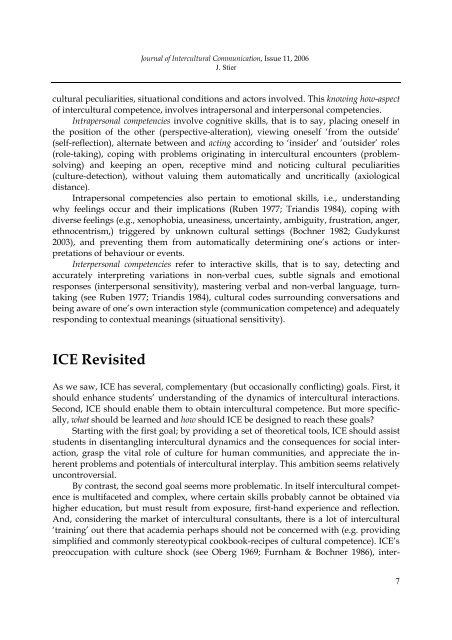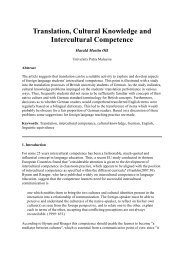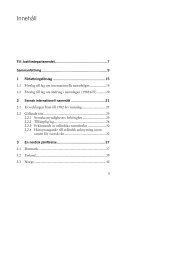Internationalisation, intercultural communication and intercultural ...
Internationalisation, intercultural communication and intercultural ...
Internationalisation, intercultural communication and intercultural ...
Create successful ePaper yourself
Turn your PDF publications into a flip-book with our unique Google optimized e-Paper software.
Journal of Intercultural Communication, Issue 11, 2006<br />
J. Stier<br />
cultural peculiarities, situational conditions <strong>and</strong> actors involved. This knowing how-aspect<br />
of <strong>intercultural</strong> competence, involves intrapersonal <strong>and</strong> interpersonal competencies.<br />
Intrapersonal competencies involve cognitive skills, that is to say, placing oneself in<br />
the position of the other (perspective-alteration), viewing oneself ‘from the outside’<br />
(self-reflection), alternate between <strong>and</strong> acting according to ‘insider’ <strong>and</strong> ‘outsider’ roles<br />
(role-taking), coping with problems originating in <strong>intercultural</strong> encounters (problemsolving)<br />
<strong>and</strong> keeping an open, receptive mind <strong>and</strong> noticing cultural peculiarities<br />
(culture-detection), without valuing them automatically <strong>and</strong> uncritically (axiological<br />
distance).<br />
Intrapersonal competencies also pertain to emotional skills, i.e., underst<strong>and</strong>ing<br />
why feelings occur <strong>and</strong> their implications (Ruben 1977; Tri<strong>and</strong>is 1984), coping with<br />
diverse feelings (e.g., xenophobia, uneasiness, uncertainty, ambiguity, frustration, anger,<br />
ethnocentrism,) triggered by unknown cultural settings (Bochner 1982; Gudykunst<br />
2003), <strong>and</strong> preventing them from automatically determining one’s actions or interpretations<br />
of behaviour or events.<br />
Interpersonal competencies refer to interactive skills, that is to say, detecting <strong>and</strong><br />
accurately interpreting variations in non-verbal cues, subtle signals <strong>and</strong> emotional<br />
responses (interpersonal sensitivity), mastering verbal <strong>and</strong> non-verbal language, turntaking<br />
(see Ruben 1977; Tri<strong>and</strong>is 1984), cultural codes surrounding conversations <strong>and</strong><br />
being aware of one’s own interaction style (<strong>communication</strong> competence) <strong>and</strong> adequately<br />
responding to contextual meanings (situational sensitivity).<br />
ICE Revisited<br />
As we saw, ICE has several, complementary (but occasionally conflicting) goals. First, it<br />
should enhance students’ underst<strong>and</strong>ing of the dynamics of <strong>intercultural</strong> interactions.<br />
Second, ICE should enable them to obtain <strong>intercultural</strong> competence. But more specifically,<br />
what should be learned <strong>and</strong> how should ICE be designed to reach these goals?<br />
Starting with the first goal; by providing a set of theoretical tools, ICE should assist<br />
students in disentangling <strong>intercultural</strong> dynamics <strong>and</strong> the consequences for social interaction,<br />
grasp the vital role of culture for human communities, <strong>and</strong> appreciate the inherent<br />
problems <strong>and</strong> potentials of <strong>intercultural</strong> interplay. This ambition seems relatively<br />
uncontroversial.<br />
By contrast, the second goal seems more problematic. In itself <strong>intercultural</strong> competence<br />
is multifaceted <strong>and</strong> complex, where certain skills probably cannot be obtained via<br />
higher education, but must result from exposure, first-h<strong>and</strong> experience <strong>and</strong> reflection.<br />
And, considering the market of <strong>intercultural</strong> consultants, there is a lot of <strong>intercultural</strong><br />
‘training’ out there that academia perhaps should not be concerned with (e.g. providing<br />
simplified <strong>and</strong> commonly stereotypical cookbook-recipes of cultural competence). ICE’s<br />
preoccupation with culture shock (see Oberg 1969; Furnham & Bochner 1986), inter-<br />
7

















